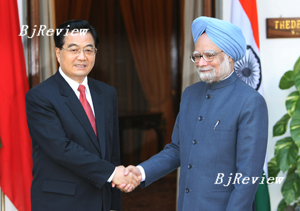
"Harmonious" seems to have become a hot-button word in the international community. "We pledged to continue our work toward a dynamic and harmonious Asia-Pacific community by building strong societies for the well-being of our peoples," stated the Hanoi Declaration adopted by the leaders of the 21-member Asia-Pacific Economic Cooperation (APEC) forum at their recent summit.
This echoed China's current worldview of a harmonious world developed under President Hu Jintao. Addressing the APEC summit in the Vietnamese capital on November 18, Hu indicated that China would join hands with APEC countries to shape a harmonious, peaceful and prosperous Asia-Pacific community.
The APEC forum was only one of the numerous occasions on which Hu has emphasized the concept. Promoting the idea was at the top of the Chinese president's agenda as he toured Viet Nam, Laos, India and Pakistan from November 15-26, experts say.
Powered by trade
Ruan Zongze, Vice President of the China Institute of International Studies (CIIS), called Hu's four-nation visit "a tour of good neighborly diplomacy." He stressed that relations with neighboring countries are of primary importance for China as it seeks to build a harmonious world. China has more neighbors than any other country in the world, he noted, adding that establishing good ties with them is a pressing strategic task.
Sharing Ruan's views, Hu Shisheng, an expert on South Asian studies at the China Institutes of Contemporary International Relations (CICIR), believes the most concrete and notable progress made during the trip was in economic and trade cooperation.
Chinese Foreign Minister Li Zhaoxing recently briefed the media about Hu's tour. According to Li, 54 documents were signed on cooperation between China and other countries in various fields, in addition to the five joint statements and declarations that were released.
Li said economic and trade cooperation is a key component of China's relationship with the four countries.
He noted that China and Viet Nam signed a number of cooperation documents during Hu's visit, setting out the framework for bilateral economic cooperation in the next five to 10 years. The two sides agreed to promote cooperation on major projects, expand bilateral trade and work together to push forward negotiations on investment and trade in services related to a free trade agreement between China and the Association of Southeast Asian Nations (ASEAN), he said.
Viet Nam is a member of ASEAN, which has agreed to set up a free trade area with China by 2010.
Li said China and Laos pledged to expand bilateral trade and enhance cooperation in the fields of investment, communications, transportation, infrastructure, energy and mining.
China and India signed a pact on investment promotion and protection, agreeing to strengthen cooperation in the areas of information and communication technology, energy, infrastructure, science and technology and agriculture, the foreign minister said. The two sides also set a target of raising the annual volume of bilateral trade to $40 billion by 2010, he added.
Li said China and Pakistan signed a free trade agreement that is projected to triple their current bilateral trade to $15 billion within five years and to promote cooperation in agriculture, transportation, energy, finance and the information industry.
In an interview with Beijing Review, Hu of the CICIR singled out several achievements that he believes are of special significance. Given the fact that political relations between China and Pakistan have been more valued than their economic relations, the free trade agreement and the ambitious trade target are set to upgrade the countries' economic ties, thus promoting across-the-board cooperation between the two countries, he said.
Hu noted that China made concessionary trade arrangements with countries in a disadvantaged position in international competition such as Viet Nam, Laos and Pakistan. He said with these arrangements, China undertook greater responsibilities commensurate with its a major power status in the region. As it pursues common development through expanding economic and trade links, China is demonstrating its policy of seeking harmonious relations with neighboring countries, the expert argued.
Working toward rapport
At a press conference after their meeting in New Delhi, Chinese President Hu Jintao and Indian Prime Minister Manmohan Singh hailed bilateral relations.
Hu noted that China and India share broad common interests in bilateral, regional and international dimensions. "Both China and India are confident of our future relationship and are willing to work together to facilitate all-around and in-depth development of a strategic and cooperative partnership," he said.
Singh, for his part, asserted that cooperation between India and China has global significance. He said the nature and range of agreements signed during Hu's visit pointed to the consolidation and diversification of bilateral ties.
The warming up of relations between Beijing and New Delhi has caught the world's attention in recent years, but not everything is rosy, experts say.
Hu of the CICIR observed that the two countries are still suffering from a lack of trust, as evidenced by the solemn and impersonal atmosphere that prevailed at the leaders' meetings. Given this, he pointed out that the time is not ripe for resolving the border dispute between the two countries. They must make meaningful concessions before coming up with a mutually acceptable solution, he said.
During Chinese Premier Wen Jiabao's visit to India last year, the two countries vowed to build a strategic and cooperative partnership for peace and prosperity. However, shaping a partnership is a gradual process rather than a goal that can be reached in one leap, Hu said.
Frequent and regular high-level visits are an important part of a strategic partnership, he said. The Chinese premier and president paid visits to India in the space of less than two years, a fact that he believes shows the great importance the Chinese leadership attaches to strategic exchanges with India.
The expert noted that President Hu's visit provided a fresh impetus to bilateral trade. He told Beijing Review that India often rejected Chinese investments in the communications sector, ports and airports by citing security concerns. In this context, the pact is expected to strengthen their mutual trust. The $40 billion trade target is also indicative of their resolve to cement trade relations. Moreover, the two countries have started feasibility studies for a regional trade arrangement set to be completed by October next year.
Cooperation between China and India on nuclear energy is being closely monitored by experts. According to the joint declaration issued by the two countries, international civilian nuclear cooperation should be advanced through innovative and forward-looking approaches, while safeguarding the effectiveness of international non-proliferation principles. "Although the declaration did not lay out details, it may open up prospects for cooperation in this hotly contested field and is certainly a positive signal," CICIR's Hu said.
A far-reaching theory
According to Ruan of the CIIS, neighboring countries occupy a key place in China's diplomatic strategy. Apart from high-level visits, China held celebrations marking the fifth anniversary of the founding of the Shanghai Cooperation Organization and the 15th anniversary of the China-ASEAN dialogue partnership to strengthen the bond with its neighbors this year.
"China has taken concrete actions to expand common interests with neighboring countries in the spirit of seeking converging interests," Ruan wrote in an article published by china.org.cn, one of China's major news and information websites. "As the framework for harmonious relations with neighboring countries takes shape, China has been increasingly recognized as the 'anchor' and 'engine' for the stability and prosperity of these countries."
Ruan noted that China lost no time in resolving border disputes with some neighboring countries. By October 2004, it had completely demarcated its 4,300-km border with Russia. Since 1999, China and Viet Nam have resolved issues concerning land border demarcation, demarcation of the Beibu Bay and fishing in the bay. Officials from both sides recently agreed to accelerate the installation of border markers under an agreement signed last year on completing the demarcation of the 1,350-km land border by 2008.
China, the Philippines and Viet Nam have started to explore the South China Sea collaboratively, exemplifying the principle of "shelving disputes and conducting joint exploration."
Ruan also noted that China made every effort to keep peace and stability in the border region through confidence building. For example, it signed an agreement with India on the political parameters and guiding principles for settling their boundary question last year.
During President Hu's visit to India, the two countries reaffirmed their commitment to resolving the border issue at an early date. "The two are determined to resolve outstanding differences, including the boundary question, through peaceful means and in a fair, reasonable, mutually acceptable and proactive manner, while ensuring that such differences are not allowed to affect the positive development of bilateral relations," said their joint declaration.
At the same time, Ruan analyzed what a harmonious neighboring environment could mean to China. First of all, it helps China to secure a close and direct regional market. China's trade with neighboring countries accounts for over 60 percent of its total foreign trade, whereas the investment it receives from these countries takes up over 70 percent of the total foreign investment in China, Ruan noted.
Also, he said establishing harmonious relations with neighbors is conducive to political stability and security in the region. Achieving harmony with these countries ensures that China's modernization program progresses smoothly at home as well.
Ruan underscored the need for China to devise its own vision about the future of the world. Today, China is presented with a good opportunity to introduce its diplomatic concepts to the world and strengthen its "soft power," as the international community is interested in what it says and does, he said.
The theory of a "harmonious world" helps the country counteract the "China threat" rhetoric and have a bigger say in international affairs, he commented.
| 